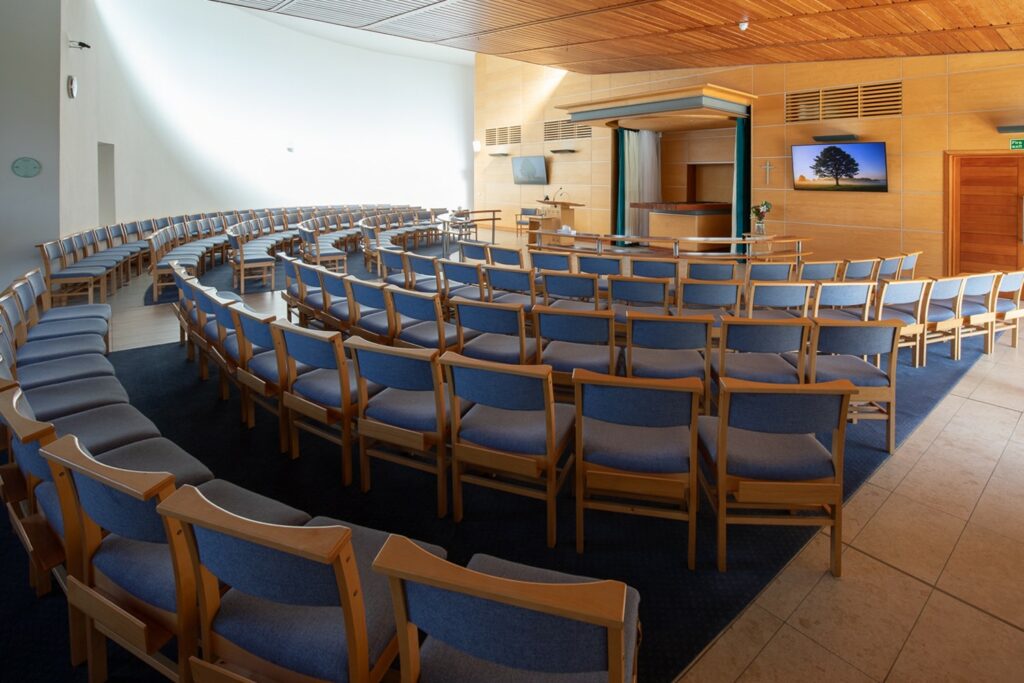Standard service
Our standard service time is:
- 45 minutes with 30 minutes of chapel time at Chilterns Crematorium
- 60 minutes with 45 minutes of chapel time at Bierton Crematorium
Extra service time is available, extending your service to double the standard time.
Accessibility
All our chapels and facilities are completely accessible to all our attendees. If you have any concerns or would like the use of our wheelchairs, please contact our office.
Scattering of ashes
A scattering of ashes in our Gardens of Remembrance is included with all our cremations. This can be in attendance with or without our memorial officer. Either option is free and part of the cremation service and can take place any time after the cremation.
Tours
We welcome everyone to have a tour of our chapels, grounds, facilities and crematory. Please contact our office to arrange a date and time.

Frequently asked questions
Yes.
The code of cremation practice states that the coffin and the body must enter the cremator as received at the crematoria.
It will not be opened or otherwise disturbed, other than in exceptional circumstances and then only with the express permission in the presence of the applicant for cremation. This is usually the executor or next of kin.
Yes.
The code of cremation practice states that the coffin and the body must enter the cremator as received at the crematoria.
It will not be opened or otherwise disturbed, other than in exceptional circumstances and then only with the express permission in the presence of the applicant for cremation. This is usually the executor or next of kin.
The cremation should take place shortly after the funeral, on the same day as the service unless:
- the service takes place late in the day
- there is a limited number of services on that day
We’ll always carry out cremations within 72 hours of the funeral service
We do this to reduce the impact on the environment and ensure we operate in the most efficient way.
A cremator can only accept one coffin at a time. We always remove the remains from the cremator before the next cremation.
An identity card is used throughout the whole process, this ensures correct identification.
Ashes or cremated remains are defined as:
‘everything that is left in the cremator at the end of the cremation process following the removal of any metal’.
There is no separation of ash from the coffin and other items from the deceased person.
The cremator will only accept one coffin at a time.
However, we can make exceptions for a mother and baby or small twin children if the next of kin or executor has made this specific request.
There are instances where elderly couples who have died within a day or two of each other are cremated in the same coffin. This is not unlawful if the applicant for cremation has made this request as long as the coffin dimensions are suitable for the chosen crematorium.
Our crematoria allows public inspection of the ‘behind the scenes’ procedures to enlighten the public on all aspects of the cremation process.
The ICCM Charter for the Bereaved gives detailed information.
It covers all aspects of the cremation process and encompasses environmental and social aspects.
You can get a full reference copy of the Charter document from:
As a council-run crematoria, we are unable to recommend any individual companies. However, we would recommend that you visit a range of funeral directors to find one that is right for you.
You do not need to remain with a funeral director who has collected your loved one after death and can change to one of your choosing.
It is also a good idea to choose a funeral director who is a member of the National Association of Funeral Directors (NAFD), for example:
- National Association of Funeral Directors (nafd)
- National Society of Allied and Independent Funeral Directors (SAIF)
These organisations ensure that all their members adhere to strict codes of conduct, complaint procedures and price transparency policies that ensure you will receive a high level of service.
If you’re unable to afford to pay for a funeral, you may be able to:
- apply for a funeral expenses payment (GOV.UK)
- request a public health funeral from your local council